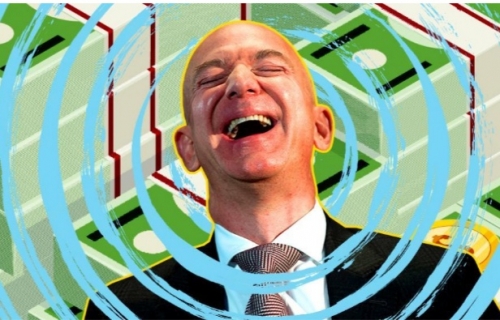Ajiri
Computer Scientist : HND Graduate, From Ozoro Polytechnic Delta State, Nigeria. Worked At Salus Trust LTD.
Wants to meet Work Partners : Preferably People Working On Any Programming Related Projects At The Moment. Send A Message
Articles
43
Followers
21
profile/1711PSX_20200322_135837.jpg
Ajiri

Do You Agree That No One Deserves To Be A Billionaire?
~4.8 mins read
"Does anyone deserve to have a billion dollars?"
That's one of the questions The New York Times recently put to the avalanche of candidates coming for the Democratic party’s presidential nomination in 2020.
A few of them, and not necessarily the most left-wing ones, offered a squishily-philosophic no. "I'm not sure anybody cosmically or morally deserves to have a billion dollars," as South Bend Mayor Pete Buttigieg put it. Others were more positive: John Hickenlooper, the former governor of Colorado, thinks the aspiration to make a billion dollars "drives a lot of our economy." One thing just about everyone agreed on was that the existence of billionaires is offensive in the context of a society also beset by inequality, poverty and deprivation of opportunity. "It's a question that isn't meaningful outside its moorings," as Sen. Elizabeth Warren (D-Mass.) put it.
Perhaps a way to cut through the murk would be to change the question: Once we've made the changes necessary to create a truly just society, would billionaires still exist? If we made a world where opportunity is abundant and prosperity is shared, would the rejiggering of resources and money flows still leave room for billionaires to become billionaires?
I think it's safe to assume the answer is "no."
But let's sit with that question of "deserving" for a moment. The CEOs of America's largest companies make something like 300 times as much as the typical worker. Is anyone willing to defend the idea that any human being is really able to provide society with labor that is 300 times more useful than another's? Keep in mind the lowest paid workers in the U.S. include jobs such as farm workers and personal home health care aids. These are the people who sweat and toil to make our food; the people who care for our family members or ourselves when we can no longer walk or exercise or shower or take our medicine or use the bathroom on our own.
Who could American society more easily do without? If all the country's personal home health aids, and its top paid CEOs — folks like Elon Musk (Tesla), Bob Iger (Walt Disney Co.), Tim Cook (Apple), and Stephen Schwarzman (the investment firm Blackstone) — all disappeared tomorrow, who would we miss more? Whose absence would throw our daily economic interactions and the social fabric of our lives into greater turmoil?
Defenders of the capitalist order will point out that anyone can be a farmworker or a dishwasher. These jobs are easily replaceable, which is why they are paid poorly. Not everyone can be CEO of Apple, thus the position pays more. It's just a consequence of supply and demand. But that is not the question. A better thing to ask ourselves is: Does anyone need to be CEO of Apple? That company is staffed by thousands of workers and software engineers and more. They're all perfectly intelligent people. Under a different arrangement, a form of worker-elected committee could run the company just fine. (Some oddball worker co-ops already operate this way.) Does anyone really think that Apple could not possibly function without Tim Cook, or some other individual of similar oligarchical baring, at its head.
Corporate CEOs are not paid gobs of money because some god-like market mechanism adjudicated the value of their labor. They're paid gobs of money because every company is a miniature society, and we design corporate governance in a way that gives CEOs vast and disproportionate power in those miniature societies. The money they take in is not from wealth creation they're solely responsible for — it's from their prerogative to dictate where the wealth created by the company and all its other workers goes. The same point applies to the shareholder class, whose Wall Street sandbox is now the premiere location for wealth extraction across the whole economy.
These questions of law and market design shape every aspect of where money flows and to whom. There are mergers and off-shoring and monopolies and anti-competitive practices; there's reliance on outside contractors and forced arbitration clauses and non-compete agreements; there used to be unions, and then we changed our laws and our social practices and smashed them all to bits. We used to have policies that prioritized full employment, imposing permanent labor shortages on the country, and forcing employers to actually compete for workers' favor. (Imagine that.) Now we have chronic unemployment, a Congress whose fiscal policies keep the economy perpetually under-stimulated, and policymakers obsessed with preventing non-existent inflation. All of these changes served to depress the power of everyday people and laborers, decreasing the flows of money they can claim, and shoving even more of the remainder towards the top.
But the most fundamental problem, the problem that drives all of these other problems, is that money — or, more precisely, wealth — is power. A billionaire has gobs of capital to invest in new enterprises, dictating to the rest of us what jobs will be created, for whom, to do what, and paying how much. More than that, it's billionaires who, by virtue of the power that makes them billionaires, control the financial system and the corporate governance that shapes all the economic activity in the country. What jobs we do and can or can't get, what we're paid and under what conditions we work; these are all huge aspects of Americans' everyday lives. And billionaires run all of it like feudal lords.
Yes, some billionaires also donate immense sums to charity. But in many ways this just recapitulates the problem: The small population of billionaires gets to decide the goals and priorities and organizational values of so much of the philanthropic work across both the U.S. and the globe.
Finally, billionaires shape our politics. This is not simply a matter of donations, though that certainly plays a role. It's that, as a matter of raw social gravity, billionaires command politicians' time and focus and social circles. Inevitably, politicians come to see the world more like billionaires see it. Which basically means being a billionaire means having enormous influence with which to convince your fellow citizens that billionaires are necessary. This does not require anyone to be an evil genius or a malevolent villain. It simply requires billionaires to be flawed, solipsistic, everyday human beings just like the rest of us, only imbued with wildly disproportionate sway in society.
The problem, at its most basic, is that in a society with billionaires, genuine democracy is not actually possible.
profile/1711PSX_20200322_135837.jpg
Ajiri

Very Soon We Will All Be Able To Send Payments Through WhatsApp
~2.6 mins read
WhatsApp is one of the most popular messaging apps in the world with more than 1 billion active users. Whether that success was brought by Facebook, after the social media giant acquired it, or despite that, is debatable, but the numbers don’t lie. In many countries, WhatsApp is now the go-to means for communication.
Well, Facebook wants WhatsApp to become an even bigger part of people’s lives and is making a big step towards that goal. WhatsApp just announced on its blog that for the first time, people will be able to send money through the app.
The service will be powered by Facebook Pay and is currently only available in Brazil but Facebook is looking “forward to bringing it to everyoneâ€. How long that will take is not clear.
The service will be powered by Facebook Pay and is currently only available in Brazil but Facebook is looking “forward to bringing it to everyoneâ€. How long that will take is not clear.
Naturally, there are regulations that you have to comply with when offering financial services and you need local banks to work with. In Brazil, Facebook already has 3 banks on board and is looking to add more partners.
The transactions will require a 6-digit PIN or your fingerprint, so don’t worry about people grabbing your phone and sending money willy-nilly.
The move isn’t very surprising. In China, the social media Weibo is used for a wide range of services, including payments, to the point that it has mostly replaced traditional payment methods like credit cards and cash.
Many users might be hesitant to trust Facebook with their financial information because of its poor track record when it comes to privacy protection. The company will have to prove it can be trusted if it wants this venture to succeed. We’ll see how that goes.
The transactions will require a 6-digit PIN or your fingerprint, so don’t worry about people grabbing your phone and sending money willy-nilly.
The move isn’t very surprising. In China, the social media Weibo is used for a wide range of services, including payments, to the point that it has mostly replaced traditional payment methods like credit cards and cash.
Many users might be hesitant to trust Facebook with their financial information because of its poor track record when it comes to privacy protection. The company will have to prove it can be trusted if it wants this venture to succeed. We’ll see how that goes.
Advertisement

Link socials
Matches
Loading...

